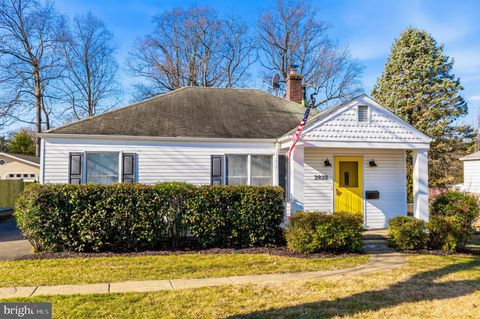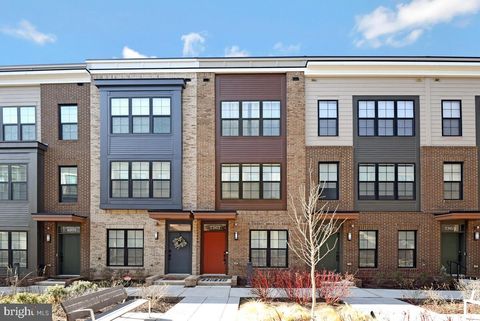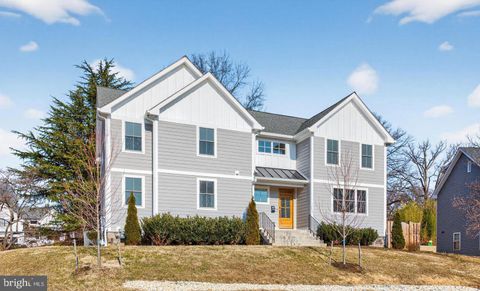Table of Contents
#1: You’ll Need a Strategy to Buy Here
#2: Falls Church Schools Are a Double-Edged Sword
#3: Constantly Going Outside City Limits
#4: Lively Local Culture
#5: Not Just One Falls Churc
Introduction
Before you start scrolling listings or planning a visit to Falls Church City, there are a few things you need to know.
I’m gonna break down what most people miss when they’re eyeing this area.
The stuff that’ll actually affect your day-to-day life once you’re here.
Now, if you want something more in-depth about the area, we've got a Falls Church ultimate guide for you, covering everything from the best neighborhoods to childcare.
Alright, let’s get into the things you need to know before moving to Falls Church.
#1: You’ll Need a Strategy to Buy Here
Let me just say it—you cannot wing it in Falls Church.
If you're thinking about buying here, you're gonna need a game plan.
Here’s the deal: in Northern Virginia, the homebuying process moves fast.
We're talking fast-paced showings, tight offer deadlines and sellers who expect serious buyers: pre-approved, ready to move.
No time wasted.
Now take that base-level intensity and drop it inside Falls Church City, a place with a tiny footprint, limited inventory, and super high demand.
It's like playing the homebuying game on expert mode.
Falls Church homes don’t just sit on the market.
When something desirable hits—especially if it's in budget, in good condition, and in a top-tier school zone—it’s gonna draw a crowd.
You might be up against multiple offers, cash buyers, people waiving contingencies… all of it.
That’s why you need a strategy before you even step foot inside a property.
You need to understand the market data, know how to write a clean offer, and have your financing rock solid.
But here's the good news: you don’t have to figure this out alone.
This is literally what I help buyers do—navigate competitive markets like Falls Church with a step-by-step plan.
That means we’re talking strategy upfront: how to find the right neighborhoods, how to time your move, how to avoid bidding wars if possible and stay level-headed when emotions are high.
This is a high-stakes environment, but if you're prepared, you can win.
And if you’re not working with someone who knows how this specific market behaves? You’re not just behind—you’re invisible.
Sellers here expect sharp offers from buyers who know what they’re doing
Anything less, and your offer's just background noise.
Bottom line: Falls Church isn’t for the casual buyer.
But if you’re serious—and you’ve got a strategy—you can absolutely compete here.
And a big reason so many families compete for a spot here? The schools
#2: Falls Church Schools Are a Double-Edged Sword
If you’re moving to Falls Church with school-aged kids—or even just planning ahead—you’ve probably heard about the schools.
Let me confirm it for you: they’re legit.
Falls Church City Public Schools are consistently ranked among the very best in Virginia.
We’re talking about the top school district in the entire state, according to Niche’s rankings.
This is the kind of district people build their entire move around.
But here’s the flip side—because there is one.
That same reputation creates pressure, demand, and competition.
Like the city, the school district is tiny—one high school, one middle school, and two elementary schools.
That boutique setup? It’s great for families who get in… but it also means limited capacity.
Classrooms can fill up quickly, and when they do, the City has to consider boundary changes or redistricting.
And let’s not forget the housing angle.
I’ve seen families enter bidding wars just to get into a specific zone in the region.
It’s not just about buying a house—it’s about buying into a school boundary.
So yes, the schools are a huge asset. They’re a draw. They add value.
But they also drive up prices, limit flexibility, and add pressure to the home search.
That’s why I call it a double-edged sword.
Incredible school system? Absolutely.
But you’ll need to approach it with strategy, patience, and probably a bit of grit.
The school system is only one piece of what makes Falls Church different. The city itself isn’t like your typical suburb.
#3: Constantly Going Outside City Limits
If you’re thinking about moving to Falls Church, here’s something you need to know up front:
You’ll be crossing city lines more often than you think.
The City of Falls Church keeps things tight, local, and small-scale.
And while that’s part of the charm, it also means some everyday essentials won’t be right down the street.
Need to see a specialist at a major hospital?
You’re heading to Inova Fairfax or Virginia Hospital Center—both nearby, but not within the city.
Need a bulk Costco run or want to shop at a Target, REI, or Home Depot?
That’s a quick trip to Merrifield, Seven Corners, or Tysons.
Falls Church gives you the lifestyle of a quiet urban village, but you’ll still be leaning on the surrounding areas for big-ticket services.
There’s no traditional mall here, no warehouse retail, and very few national chains.
You’ll also find limited nightlife…
And if you’re looking for late-night vibes or craft cocktail bars, you’re probably hopping over to Arlington or D.C.
This isn’t a complaint—it’s just part of the equation.
Living in Falls Church often means you live here... but you do life across a wider radius.
That also means dealing with the Northern Virginia traffic…
And you’ve got to be okay with that rhythm.
So if you’re expecting a one-stop-shop kind of suburb, this isn’t that.
But if you like the idea of living in a low-key, community-first area and don’t mind a little logistical juggling…
Falls Church can still fit beautifully into your lifestyle.
Of course, small doesn’t always mean limited. In fact, living in Falls Church has its perks.
#4: Lively Local Culture
If you’re moving to Falls Church expecting rooftop lounges and a nightclub scene…
You’re gonna be disappointed.
But if you’re looking for a place where your week includes…
Walking to a year-round farmers market,
Grabbing a drink at a neighborhood brewery,
And running into your neighbors at a Friday night concert in the park…
This is your place.
Falls Church has a low-key but seriously rich local culture.
It’s not trying to be the next Adams Morgan or Clarendon.
The vibe here is more homegrown and intentional.
You’ve got local institutions like Rare Bird Coffee, Clare & Don’s Beach Shack, Dogwood Tavern, and Ellie Bird (which, let’s be real, is high-end enough to make any D.C. foodie take the trip).
You’ll also see that same local energy in the community calendar.
There’s the Falls Church Farmers Market: every Saturday, rain or shine, year-round.
Summer concerts at Cherry Hill Park. Fall Festival. Taste of Falls Church. Tinner Hill Blues Festival. Creative Cauldron’s theater season.
And that’s just scratching the surface.
This is the kind of place where the city actually promotes the arts…
Where local theater productions draw a full house…
And where neighbors volunteer at the same events they attend.
The small business scene is strong. The civic culture is active. And the social life here is built connection.
If that’s what you’re looking for, you’re gonna feel right at home.
If Falls Church City doesn’t sound like the place for you…
You might wanna consider the greater Falls Church area.
#5: Not Just One Falls Church
Alright, this next one trips up a lot of people.
When someone says they live in Falls Church, they might not actually live in the City of Falls Church.
Because there’s more than one “Falls Church.”
There’s the City of Falls Church, which is a small, independent city with its own government, school system, police, and public works.
That’s ZIP code 22046…
A tight, two-square-mile area with walkable neighborhoods, boutique shops, and some of the highest-rated public schools in the state.
But then you’ve got what we call Greater Falls Church, and that’s where things get messy.
These are areas that use “Falls Church” in their mailing address…
But they’re actually part of Fairfax County, not the city.
We’re talking about ZIP codes 22043, 22042, 22044, and 22041.
They’re not governed by Falls Church City.
They’re under the county’s jurisdiction, and the schools, taxes, and public services are all Fairfax County.
Now, what does that mean for you as a buyer?
Well, for starters, home prices in the City are generally higher, partly because of the school district.
Falls Church City has its own top-rated boutique school system and that exclusivity comes with a premium.
In the Greater Falls Church areas, you’ll likely get more home for your money…
Larger lots, more housing variety, and access to different school pyramids depending on the zone.
You’ll also find bigger amenities in these areas: think Target, Home Depot, Seven Corners Shopping Center…
And easy access to larger commercial corridors like Route 7 and Leesburg Pike.
It’s a little more suburban, a little less curated, but still super convenient.
So if you're home shopping in “Falls Church,” you’ve gotta know the difference.
A listing might say “Falls Church,” but that doesn't mean you're in the City limits.
And trust me, that can make a huge difference in taxes, schools, walkability, resale value, and overall vibe.









